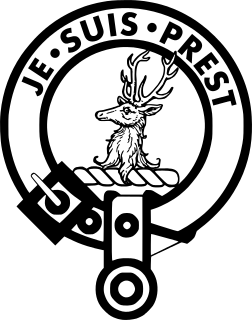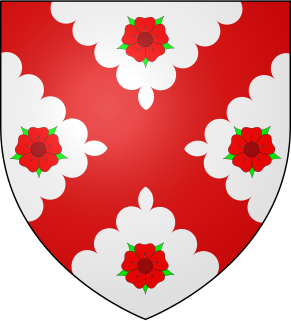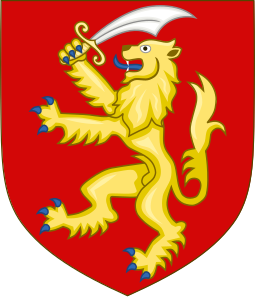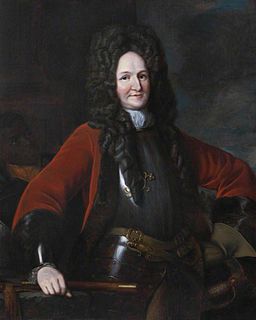
Clan Campbell is a Highland Scottish clan. Historically one of the largest and most powerful of the Highland clans, their lands were in Argyll and the chief of the clan became the Earl and later Duke of Argyll.

Clan Donnachaidh, also known as Clan Robertson, is a Scottish clan.

Clan MacNeil, also known in Scotland as Clan Niall, is a highland Scottish clan, particularly associated with the Outer Hebridean island of Barra. The early history of Clan MacNeil is obscure, however despite this the clan claims to descend from the legendary Irish King Niall of the nine hostages. The clan itself takes its name from a Niall who lived in the 13th or early 14th century, and who belonged to the same dynastic family of Cowal and Knapdale as the ancestors of the Lamonts, MacEwens of Otter, Maclachlans, and the MacSweens. While the clan is centred in Barra in the Outer Hebrides, there is a branch of the clan in Argyll (McNeill/MacNeill) that some historians have speculated was more senior in line, or possibly even unrelated. However, according to Scots law the current chief of Clan Macneil is the chief of all MacNeil(l)s.
Crínán of Dunkeld was the hereditary abbot of the monastery of Dunkeld, and perhaps the Mormaer of Atholl. Crínán was progenitor of the House of Dunkeld, the dynasty which would rule Scotland until the later 13th century. He was the son-in-law of one king, and the father of another.

Clan MacDuff or Clan Duff is a Lowland Scottish clan. The clan does not currently have a chief and is therefore considered an Armigerous clan, which is registered with the Lyon Court. The early chiefs of Clan MacDuff were the original Earls of Fife, although this title went to the Stewarts of Albany in the late fourteenth century. The title returned to the MacDuff chief when William Duff was made Earl Fife in 1759. His descendant Alexander Duff was made Duke of Fife in 1889.

Clan Donald, also known as Clan MacDonald, is a Highland Scottish clan and one of the largest Scottish clans. The Lord Lyon King of Arms who is the Scottish official with responsibility for regulating heraldry in that country, issuing new grants of coats of arms, and serving as the judge of the Court of the Lord Lyon, recognizes under Scottish law the High Chief of Clan Donald. Historically the chiefs of the Clan Donald held the title of Lord of the Isles until 1493 and two of those chiefs also held the title of Earl of Ross until 1476.

Clan Mackenzie is a Scottish clan, traditionally associated with Kintail and lands in Ross-shire in the Scottish Highlands. Traditional genealogies trace the ancestors of the Mackenzie chiefs to the 12th-century. However, the earliest Mackenzie chief recorded by contemporary evidence is Alexander Mackenzie of Kintail who died some time after 1471. Traditionally, during the Wars of Scottish Independence, the Mackenzies supported Robert the Bruce, but feuded with the Earls of Ross in the latter part of the 14th-century. During the 15th and 16th-centuries the Mackenzies feuded with the neighboring clans of Munro and MacDonald. In the 17th-century the Mackenzie chief was made Earl of Seaforth in the peerage of Scotland. During the Scottish Civil War of the 17th-century the Mackenzies largely supported the Royalists. During the Jacobite rising of 1715 the chief and clan of Mackenzie supported the Jacobite cause. However, during the Jacobite rising of 1745 the clan was divided with the chief, Kenneth Mackenzie, Lord Fortrose, supporting the British-Hanoverian Government and his relative, George Mackenzie, 3rd Earl of Cromartie, supporting the Jacobites.

Clan Grant is a Highland Scottish clan.

Clan Fraser of Lovat is a Highland Scottish clan. The Clan Fraser of Lovat has been strongly associated with Inverness and the surrounding area since the Clan's founder gained lands there in the 13th century, but Lovat is in fact a junior branch of the Clan Fraser who were based in the Aberdeenshire area. Both the Clan Fraser and the Clan Fraser of Lovat have their own separate clan chiefs who are recognized by the Lord Lyon King of Arms under Scottish law. The Clan Fraser of Lovat in Inverness-shire has historically dominated local politics and been active in every major military conflict involving Scotland. It has also played a considerable role in most major political turmoils. 'Fraser' remains the most prominent family name within the Inverness area.

Clan Cameron is a West Highland Scottish clan, with one main branch Lochiel, and numerous cadet branches. The Clan Cameron lands are in Lochaber and within their lands lies Ben Nevis which is the highest mountain in the British Isles. The Chief of the clan is customarily referred to as simply "Lochiel".

Clan Mackinnon or Clan Fingon is a Highland Scottish clan associated with the islands of Mull and Skye, in the Inner Hebrides.
Niall Glúndub mac Áedo was a 10th-century Irish king of the Cenél nEógain and High King of Ireland. Many Irish kin groups were members of the Uí Néill and traced their descent from Niall of the Nine Hostages.

Clan MacFarlane is a Highland Scottish clan. Descended from the medieval Earls of Lennox, the MacFarlanes occupied the land forming the western shore of Loch Lomond from Tarbet up-wards. From Loch Sloy, a small sheet of water near the foot of Ben Voirlich, they took their war cry of Loch Slòigh.

Clan Lamont is a Highland Scottish clan. The clan is said to descend from Ánrothán Ua Néill, an Irish prince of the O'Neill dynasty, and through him Niall Noigíallach, High King of Ireland. Clan Ewen of Otter, Clan MacNeil of Barra, Clan Lachlan, and Clan Sweeney are also descendants of Ánrothán. Traditional genealogy would therefore include Clan Lamont among the descendants of Conn Cétchathach.

Clan Maclachlan, also known as Clan Lachlan, Clann Lachainn (Argyll), and Clann Lachlainn, is a Highland Scottish clan that historically centred on the lands of Strathlachlan on Loch Fyne, Argyll on the west coast of Scotland. The clan claims descent from Lachlan Mor, who lived on Loch Fyne in the 13th century, and who has left his name upon the countryside he once controlled: places such as Strathlachlan, Castle Lachlan and Lachlan Bay. Tradition gives Lachlan Mor a descent from an Irish prince of the O'Neill dynasty, Ánrothán Ua Néill, son of Áed, son of Flaithbertach Ua Néill, King of Ailech and Cenél nEógain, died 1036. Clan Maclachlan has been associated with other clans, such as Clan Lamont, Clan Ewen of Otter, Clan MacNeil of Barra, and the MacSweens: as all claim descent from Anrothan O'Neill who left Ireland for Kintyre in the 11th century. From this descent the clan claims a further descent from the legendary Niall Noigíallach, High King of Ireland, who lived from the mid 4th century to the early 5th century.

Clan Montgomery is a Lowland Scottish clan.

Clan Moncreiffe is a Scottish clan.

Clan Scrymgeour is a Scottish clan.

Clan Macfie is a Scottish clan. Since 1981, the clan has been officially registered with the Court of the Lord Lyon, which is the heraldic authority of Scotland. The clan is considered an armigerous clan because even though the clan is recognised by the Court of the Lord Lyon, it is currently without a chief recognised by the Lord Lyon King of Arms, the judge of the Court of the Lord Lyon. The official clan name Macfie is derived from the Common Gaelic Mac Dhuibhshíthe (modern Scottish Gaelic Scottish Gaelic: MacDhubhShìth. This Gaelic patronymic name has been Anglicised into various forms, many of which are considered associated names of the clan. The clan has a long history with the islands of Colonsay and Oronsay in the Scottish Inner Hebrides, and today many monuments to various lairds and churchmen of the clan are found on these islands.
Manus O'Cahan's Regiment of Foot was an Irish regiment which served during the Wars of the Three Kingdoms in the mid-1640s.
























